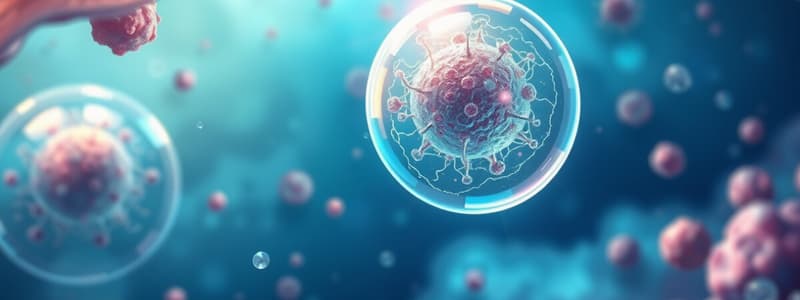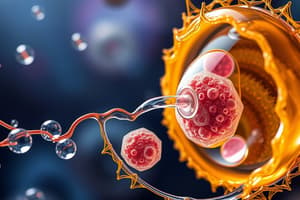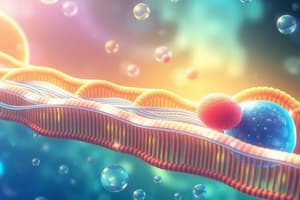Podcast
Questions and Answers
What is osmosis?
What is osmosis?
- Storage of nutrients in cells
- Process of cellular respiration
- Movement of particles from high to low concentration
- Diffusion of water across a membrane (correct)
What does hypertonic mean?
What does hypertonic mean?
Having greater concentration of solute inside than the solution outside.
What does hypotonic mean?
What does hypotonic mean?
Having a lower concentration of solute inside than the solution outside.
What does isotonic mean?
What does isotonic mean?
What is the function of a vacuole?
What is the function of a vacuole?
What is the main function of the nucleus?
What is the main function of the nucleus?
What is cytoplasm?
What is cytoplasm?
What is the role of mitochondria?
What is the role of mitochondria?
What does the cell membrane do?
What does the cell membrane do?
What is the function of the cell wall?
What is the function of the cell wall?
What do chloroplasts do?
What do chloroplasts do?
What is endoplasmic reticulum?
What is endoplasmic reticulum?
What is the golgi apparatus?
What is the golgi apparatus?
What is a prokaryote?
What is a prokaryote?
What is a eukaryote?
What is a eukaryote?
What is diffusion?
What is diffusion?
What is equilibrium?
What is equilibrium?
What does a lysosome do?
What does a lysosome do?
What is the function of the nucleolus?
What is the function of the nucleolus?
What is a vesicle?
What is a vesicle?
What is a cell?
What is a cell?
What is an organism?
What is an organism?
What is the function of a ribosome?
What is the function of a ribosome?
What is tissue?
What is tissue?
What is a light microscope?
What is a light microscope?
What does specialization mean in cells?
What does specialization mean in cells?
What is cell division?
What is cell division?
What does multicellular mean?
What does multicellular mean?
What is the nuclear membrane?
What is the nuclear membrane?
What is apoptosis?
What is apoptosis?
What does smooth endoplasmic reticulum do?
What does smooth endoplasmic reticulum do?
What does rough endoplasmic reticulum contain?
What does rough endoplasmic reticulum contain?
What does synthesize mean?
What does synthesize mean?
What is an organelle?
What is an organelle?
Flashcards are hidden until you start studying
Study Notes
Cell Transport Terms
- Osmosis: Movement of water through a membrane from high to low water concentration, crucial for cellular homeostasis.
- Hypertonic: A condition where the solute concentration is higher inside the cell, causing the cell to shrink.
- Hypotonic: A lower solute concentration inside the cell than outside, leading to cell expansion.
- Isotonic: Equal solute concentrations inside and outside the cell, representing ideal conditions for cell stability.
Cellular Structures
- Vacuole: Storage vesicles for water, food, and waste; typically one large vacuole in plant cells and multiple small ones in animal cells.
- Nucleus: The control center of the cell, housing DNA and the nucleolus; manages cell activities and protein synthesis.
- Cytoplasm/Cytosol: The cellular fluid where chemical reactions occur; supports organelles and facilitates material movement.
- Mitochondria: Organelles that convert glucose into ATP through cellular respiration, providing energy.
- Cell/Plasma/Lipid Membrane: Regulates entry and exit of substances; maintains cell shape and homeostasis; made of phospholipids in a double layer.
Additional Cell Components
- Cell Wall: A rigid structure outside the membrane of plant cells (cellulose), bacteria (glycoproteins), and fungi (chitin), providing support and protection.
- Chloroplast: Conducts photosynthesis, converting light energy into glucose and contains chlorophyll, which gives plants their green color.
- Endoplasmic Reticulum: Network of passageways for manufacturing, processing, and transporting compounds.
- Golgi Apparatus/Body/Complex: Modifies, packages, and distributes proteins and lipids produced by the endoplasmic reticulum.
Cell Types
- Prokaryote: Unicellular organisms without a nucleus or membrane-bound organelles; includes Archaea and Bacteria.
- Eukaryote: Can be unicellular or multicellular, possessing a nucleus and membrane-bound organelles; includes Fungi, Plants, Animals, and Protists.
Cellular Processes
- Diffusion: Movement of particles from an area of high concentration to low concentration; a method of transport for cells.
- Equilibrium / Homeostasis: A balanced state with minimal changes in total concentration within a system.
- Lysosome: Contains enzymes for digestion of food and waste; involved in cell apoptosis (programmed cell death).
- Nucleolus: Produces ribosomes, located within the nucleus.
Cellular Organization
- Vesicle: Small membrane-bound packages of nutrients, proteins, or wastes produced by the Golgi apparatus.
- Cell: The fundamental unit of life, the smallest structure capable of functioning independently.
- Organism: An individual living system, which can be single-celled or multicellular.
- Ribosome: Site of protein synthesis; found on the rough endoplasmic reticulum and in cytoplasm.
Tissue and Specialization
- Tissue: A group of similar cells working together to perform specific functions.
- Specialization: Cells tailored to perform unique tasks efficiently.
- Cell Division: The process where one cell divides into two new cells.
Miscellaneous
- Light Microscope: Uses light and mirrors to magnify small objects for observation.
- Multicellular: Composed of multiple cells working together.
- Nuclear Membrane/Envelope: Controls substance movement into and out of the nucleus, encasing the nucleolus and DNA.
- Apoptosis: Programmed cell death that removes cells that cannot be repaired or are potentially harmful, such as cancer cells.
- Smooth Endoplasmic Reticulum: Synthesizes lipids and transports materials within the cell.
- Rough Endoplasmic Reticulum: Studded with ribosomes for protein synthesis; also transports materials.
- Synthesize: The process of making complex substances from simpler ones.
- Organelle: Specialized structures within cells that perform distinct functions, akin to "little organs."
Studying That Suits You
Use AI to generate personalized quizzes and flashcards to suit your learning preferences.




